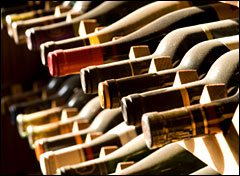Dear Umbra,
Here’s a question I couldn’t find an answer to in the Grist archives: What kind of plastic is being used for the corks in wine bottles? If I decide to put a bottle in the cellar for several years, will the plastic leach into the wine? Thanks for your help!
Holli B.
Portland, Ore.
Dearest Holli,
No need to fret: Wine bottles plugged by plastic stoppers or screw-tops can be stored upright, with the plastic separated from the liquid, getting you around the potential problem of plastics leaching into the wine. Natural cork must be kept moist so it won’t degrade and allow too much oxygen to enter the bottle; thus, corked wines are stored on their sides with the wine lapping up against the cork. For plastic stoppers, or “synthetic closures,” this leisurely recline is unnecessary.

Your wine doesn’t need to recline.
Synthetic wine bottle plugs are made from oil-based thermoplastic polymers (aka stretchy, rubbery, but also plasticized chains of molecules). Beyond that, who knows — I think it’s a trade secret. Supreme Corq is one major manufacturer of solid stoppers, which are made from a thermoplastic elastomer; the “corks” are certified by the Food and Drug Administration and approved for organic use. Nomacorc, which uses foam in its stoppers, launched a carbon footprint study to see which closures were best for climate friendliness, and its products placed second — after natural cork. (In the “no surprises here” category, aluminum screw caps came in last.) As to quality impacts, there are some reports that synthetic stoppers can cause oxidation problems that age vino prematurely. Those are a few eco-ish tidbits of the “for what it’s worth” sort, but I could find no reports of leaching. I’m somewhat reassured by the knowledge that the wine industry is obsessed with flavor, quality, and product control. If the synthetic stoppers were adding something unwanted, wouldn’t we at least hear a whisper about it from oenophiles? That thought is a small comfort in the absence of information, but it’s perhaps worth drinking to.
Although a nice glass of wine can play an important role in our environmental activism (see: staying positive), the environmental impact of the bottle closure has less to do with leaching plastics and more to do with overall manufacturing footprints. Naturally corked wine is a little prone to “cork taint,” a musty, cardboard-y taste caused by compounds in some cork. The taint issue is the only problem with natural cork, which is an environmentally preferred product. Cork oak forests in the Mediterranean are sustainably managed for the health of the trees and income of surrounding communities. A cork oak tree — which can live for about 200 years — has thick bark that is harvested every decade or so, and then grows back. The corks themselves are organic material and hence biodegradable. None of this can be said of plastic.
In short, plastic stoppers may not harm our health, insofar as we currently know — but cork is the real corker where planet health is concerned. As to whether the long-term storage of synthetically plugged wine is recommended by connoisseurs, I know not. There are plenty of wine experts out there to answer that question, so I leave it to them. Happy sipping.
Rieslingly,
Umbra


